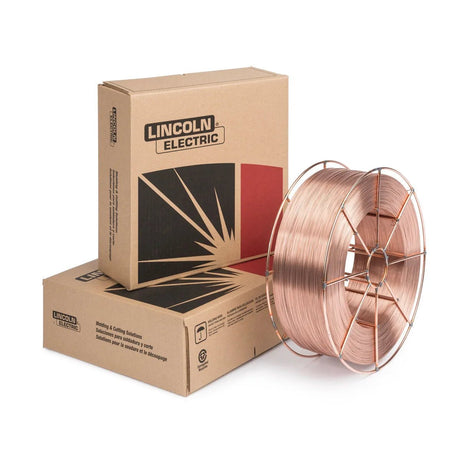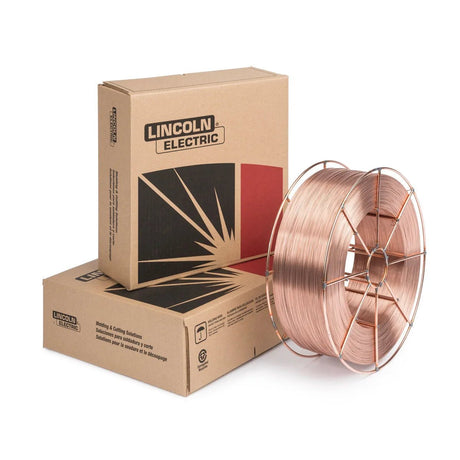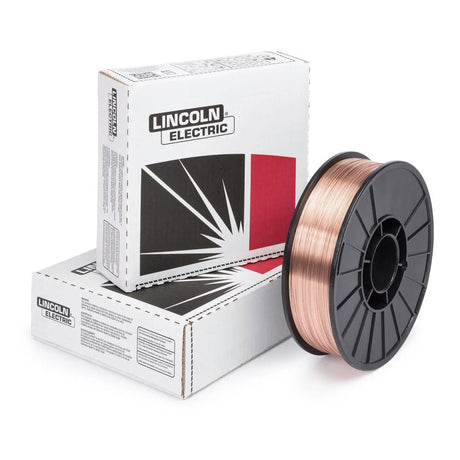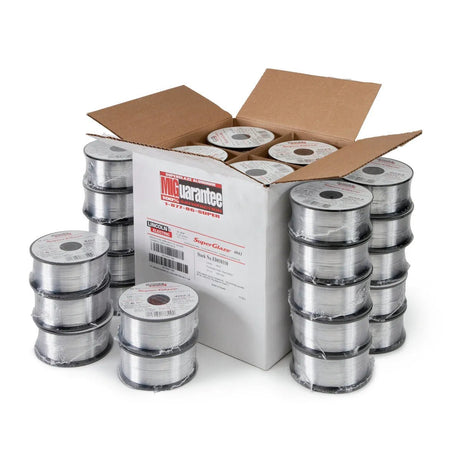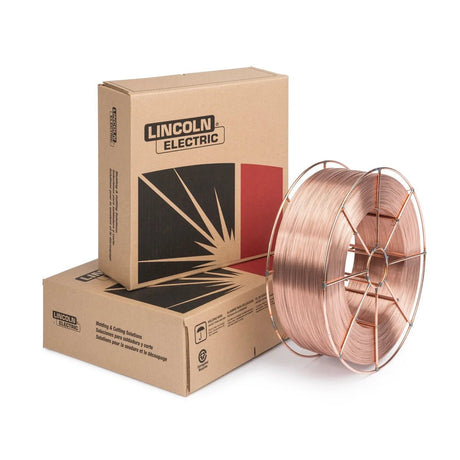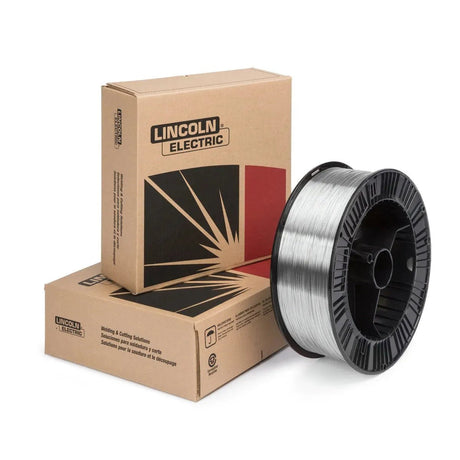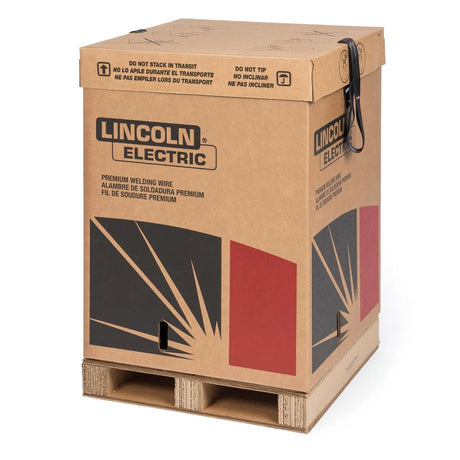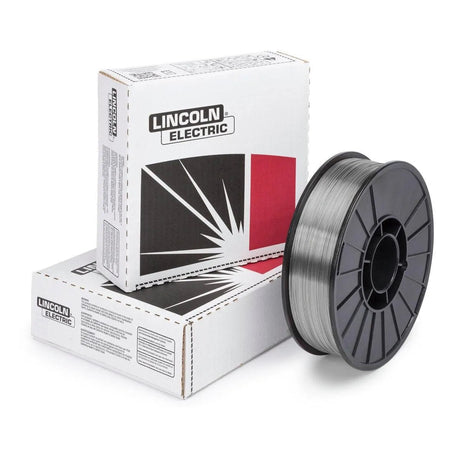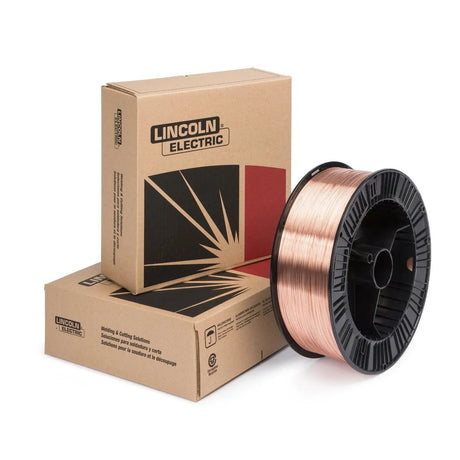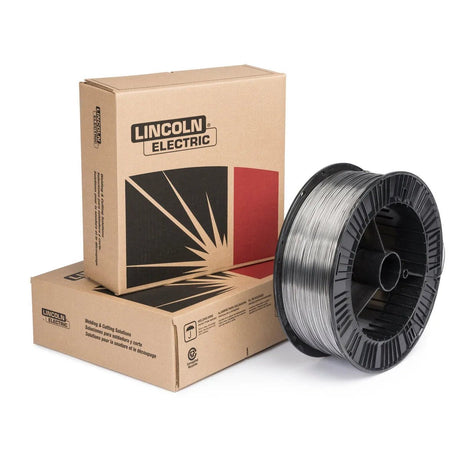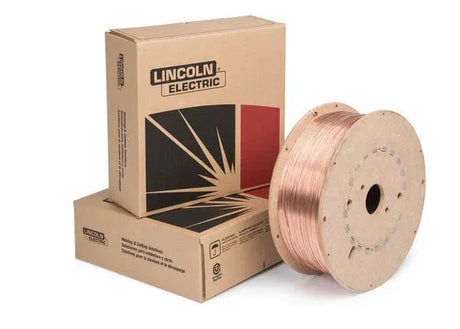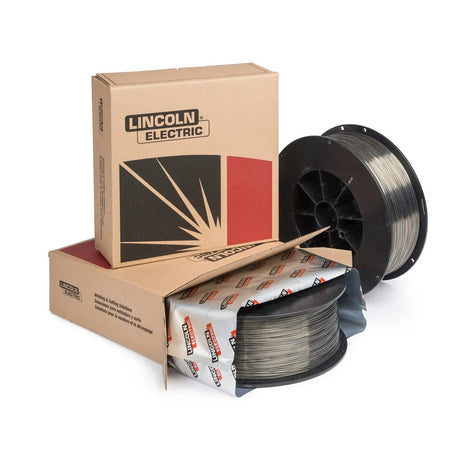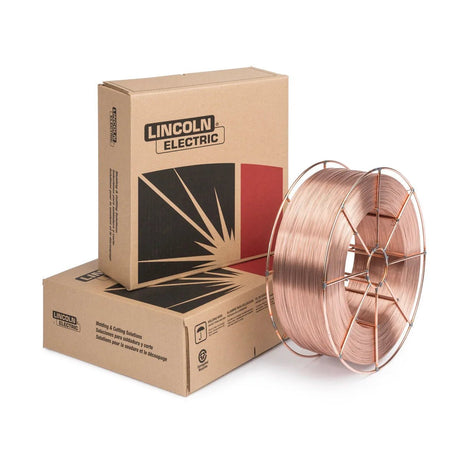Shop flux core, MIG, and aluminum welding wires for strong, reliable welds. Perfect for steel, stainless, and aluminum projects in fabrication, repair, and construction.
Lincoln ED028676 SuperArc L-56 MIG GMAW Mild Steel Welding Wire, 0.035 in, 12.5 lb Spools
$54.34$77.38Unit price /UnavailableLincoln ED031415 SuperArc LA-75 MIG GMAW Mild Steel Welding Wire, 0.035 in, 33 lb Spool
$258.15$274.56Unit price /UnavailableLincoln ED025945 SuperArc L-56 MIG GMAW Mild Steel Welding Wire, 0.035 in, 44 lb Steel Spool
$219.13$261.36Unit price /UnavailableLincoln ED029201 Outershield 71 Elite Flux-Cored FCAW-G Welding Wire, 0.045 in, 33 lb Spool
$215.87$229.35Unit price /UnavailableLincoln ED032927 SuperArc L-56 MIG GMAW Mild Steel Welding Wire, 0.035 in, 33 lb Plastic Spool
$170.62$202.95Unit price /UnavailableLincoln ED023334 SuperArc L-56 MIG GMAW Mild Steel Welding Wire, 0.030 in, 12.5 lb Spool
$67.14$79.50Unit price /UnavailableLincoln ED030308 SuperGlaze 4043 MIG GMAW Aluminum Welding Wire, 0.035 in, 20 1 lb Spools
$209.18$260.80Unit price /UnavailableLincoln ED031408 SuperArc L-50 MIG GMAW Mild Steel Welding Wire, 0.035 in, 33 lb Spool
$161.38$192.39Unit price /UnavailableLincoln ED021276 SuperArc L-56 MIG GMAW Mild Steel Welding Wire, 0.045 in, 44 lb Fiber Spool
$228.37$256.08Unit price /UnavailableLincoln ED037250 Blue Max 308LSi MIG GMAW Stainless Steel Welding Wire, 0.035 in, 33 lb Spool
$424.54$597.63Unit price /UnavailableLincoln Electric SuperArc® L-50 MIG Wire 0.045” Diameter 1000lb Accu-Pak Box - ED032844
$5,200.11$5,700.00Unit price /UnavailableLincoln ED030583 SuperArc L-56 MIG GMAW Mild Steel Welding Wire, 0.025 in, 5 2 lb Plastic Spools
$56.93$74.30Unit price /UnavailableLincoln ED015790 SuperArc L-56 MIG GMAW Mild Steel Welding Wire, 0.025 in, 12.5 lb Spool
$65.01$83.25Unit price /UnavailableLincoln ED016354 Innershield NR-211-MP Flux-Cored FCAW-S Welding Wire, 0.035 in, 10 lb Spool
$82.01$113.20Unit price /UnavailableLincoln ED032926 SuperArc L-56 MIG GMAW Mild Steel Welding Wire, 0.030 in, 33 lb Plastic Spool
$182.50$216.15Unit price /UnavailableLincoln ED031669 UltraCore 71A75 Dual Flux-Cored FCAW-G Welding Wire, 0.045 in, 33 lb Spool
$163.75$173.58Unit price /UnavailableLincoln ED030934 Innershield NR-233 Flux-Cored FCAW-S Welding Wire, 1/16 in, 25 lb Spool
$209.51$227.50Unit price /UnavailableLincoln Electric SuperArc® L-56 MIG Welding Wire 0.035” Diameter 44lb Fiber Spool - ED021274
$206.24$263.12Unit price /UnavailableLincoln ED028176 Lincore 55-G Flux-Cored FCAW-C Welding Wire, 0.045 in, 25 lb Plastic Spool
$180.44$306.50Unit price /UnavailableLincoln ED031411 SuperArc L-56 MIG GMAW Mild Steel Welding Wire, 0.035 in, 33 lb Steel Spool
$166.99$198.66Unit price /Unavailable
Comprehensive Overview of Flux Core, MIG, and Aluminum Welding Wires
Introduction to Welding Wires
Understanding the distinct characteristics of each type of wire, including aluminum flux core and MIG welding wire, is essential for welders to achieve the desired results.
What Are Welding Wires?
Welding wires are essential consumables used in a variety of welding processes to join metals like aluminum and mild steel together, often using flux core welding techniques. These wires act as both the filler material and, in some cases, the means of delivering electrical current. For welders and fabricators, selecting the right wire, be it a flux core or MIG welding wire, is critical for achieving strong, high-quality welds efficiently.
Importance in Various Welding Applications
Welding wires play a pivotal role across countless applications—from constructing steel frameworks and vehicle repairs to creating intricate metal structures in workshops. Different types of wires are tailored to suit various environments, workpiece materials, and welding techniques, ensuring the integrity and durability of the final weld. The industry offers a range of wire types, from flux core welding wire to MIG welding wire, each serving specific purposes.
Types of Welding Wires
For instance, Lincoln Electric's welding wires are known for their reliability and are favored by many professionals.
Flux Core vs. MIG vs. Aluminum
There are several common types of welding wires, each designed for specific welding processes:
- Flux Core Welding Wire: Designed with a special flux compound in its core, this wire generates a shielding gas during welding to protect the molten pool.
- This wire contains a flux compound in its core, which generates a shielding gas during welding to protect the molten pool from contaminants. It's ideal for outdoor welding and dirty or rusty materials because it doesn't rely on external shielding gas. MIG Welding Wire (Solid Wire): Used in Gas Metal Arc Welding (GMAW), MIG wire is a solid metal wire that requires an external shielding gas (such as argon or CO2) to shield the weld area from atmospheric gases.
- MIG Welding Wire (Solid Wire): Used in Gas Metal Arc Welding (GMAW), MIG wire is a solid metal wire that requires an external shielding gas, such as argon or CO2, to shield the weld area from atmospheric gases.
- Aluminum Welding Wire and Alternatives:
- Aluminum welding typically requires special wire, like ER70S-6, and specific equipment.
- Genuine aluminum MIG wire is paired with argon shielding gas, as there is currently no true aluminum flux core wire on the market. Attempting to weld aluminum with flux core wire leads to unsatisfactory results, so proper MIG techniques and dedicated aluminum wire are essential.
Applications and Suitability of Each Type
- Flux Core: Favored for field work, construction, and repair welds in windy or contaminated environments.
- The Lincoln Electric Flux Core Aluminum wire is specifically designed to work effectively in such adverse conditions.
- MIG (Solid Wire): This includes the use of Lincoln's self-shielded MIG welding wire for automotive work, fabrication shops, and projects requiring clean, precise welds on thin or medium-gauge steel.
- Aluminum MIG Wire: Required for marine equipment, transportation, and any project involving aluminum parts, provided a compatible spool gun or feeder is available.
Choosing the Right Welding Wire
Factors to Consider
Selecting the appropriate welding wire depends on several factors: - Material Type: Steel, stainless steel, carbon steel, and aluminum each require specific wire types, including flux core and aluminum MIG welding wires. - Welding Environment: Outdoor vs. indoor settings influence whether flux core or MIG wire is optimal. Lincoln Electric products stand out by providing excellent performance across various welding environments. - Thickness of Metal: Thicker materials often need flux-cored wires for deeper penetration and strength, while thinner metals pair well with MIG wires. - Equipment Compatibility: Ensure your welder supports the intended wire type and size. - Desired Weld Quality: Consider spatter, appearance, and strength requirements.
Common Mistakes to Avoid
- Using flux core wire where a clean weld appearance is critical, such as for mild steel MIG applications.
- Attempting to weld aluminum with traditional flux core wire.
- Employing dedicated Aluminum MIG Welding wire with a spool gun helps avoid common pitfalls.
- Neglecting to match wire diameter and type to your welder specifications. Failing to adjust shielding gas settings when switching between solid and flux-cored wires.
Safety Precautions for Welders
Essential Protective Gear
Safety is paramount when working with any welding wire, including Lincoln Electric's products. Always use: - A properly rated welding helmet with auto-darkening lens - Flame-resistant gloves and aprons - Long-sleeved, non-synthetic clothing - Safety glasses - Work boots with steel toes
Work in well-ventilated areas to avoid inhaling fumes, particularly from flux core aluminum welding.
- Work in well-ventilated areas to avoid inhaling fumes. Regularly inspect welding equipment and replace worn consumables. Keep flammable materials away from the welding area.
- Accessories like the torch and spool gun are essential tools that help ensure welding success.
- Ensure proper grounding of your equipment.
Conclusion and Recommendations
Final Tips for Selecting Welding Wire
Start by identifying your base material and environmental conditions, then select the welding wire like Lincoln Electric that meets your project’s requirements. Remember: - Use flux core for outdoor or contaminated materials. - Opt for MIG wire in controlled environments for cleaner results. - Choose dedicated aluminum MIG wire (with the right equipment) for all aluminum projects.
Where to Buy Quality Welding Wire
Quality welding wires are available from trusted brands at local welding supply stores, major hardware retailers, and specialized online suppliers. Look for top-rated brands and check user reviews to ensure you get reliable and consistent performance for your welding needs.
By understanding the characteristics and applications of flux core, MIG, and aluminum welding wires, welders can make informed decisions that ensure safety, efficiency, and high-quality results in every project.
Comprehensive Overview of Flux Core, MIG, and Aluminum Welding Wires
Introduction to Welding Wires
Understanding the distinct characteristics of each type of wire, including aluminum flux core and MIG welding wire, is essential for welders to achieve the desired results.
What Are Welding Wires?
Welding wires are essential consumables used in a variety of welding processes to join metals like aluminum and mild steel together, often using flux core welding techniques. These wires act as both the filler material and, in some cases, the means of delivering electrical current. For welders and fabricators, selecting the right wire, be it a flux core or MIG welding wire, is critical for achieving strong, high-quality welds efficiently.
Importance in Various Welding Applications
Welding wires play a pivotal role across countless applications—from constructing steel frameworks and vehicle repairs to creating intricate metal structures in workshops. Different types of wires are tailored to suit various environments, workpiece materials, and welding techniques, ensuring the integrity and durability of the final weld. The industry offers a range of wire types, from flux core welding wire to MIG welding wire, each serving specific purposes.
Types of Welding Wires
For instance, Lincoln Electric's welding wires are known for their reliability and are favored by many professionals.
Flux Core vs. MIG vs. Aluminum
There are several common types of welding wires, each designed for specific welding processes:
- Flux Core Welding Wire: Designed with a special flux compound in its core, this wire generates a shielding gas during welding to protect the molten pool.
- This wire contains a flux compound in its core, which generates a shielding gas during welding to protect the molten pool from contaminants. It's ideal for outdoor welding and dirty or rusty materials because it doesn't rely on external shielding gas. MIG Welding Wire (Solid Wire): Used in Gas Metal Arc Welding (GMAW), MIG wire is a solid metal wire that requires an external shielding gas (such as argon or CO2) to shield the weld area from atmospheric gases.
- MIG Welding Wire (Solid Wire): Used in Gas Metal Arc Welding (GMAW), MIG wire is a solid metal wire that requires an external shielding gas, such as argon or CO2, to shield the weld area from atmospheric gases.
- Aluminum Welding Wire and Alternatives:
- Aluminum welding typically requires special wire, like ER70S-6, and specific equipment.
- Genuine aluminum MIG wire is paired with argon shielding gas, as there is currently no true aluminum flux core wire on the market. Attempting to weld aluminum with flux core wire leads to unsatisfactory results, so proper MIG techniques and dedicated aluminum wire are essential.
Applications and Suitability of Each Type
- Flux Core: Favored for field work, construction, and repair welds in windy or contaminated environments.
- The Lincoln Electric Flux Core Aluminum wire is specifically designed to work effectively in such adverse conditions.
- MIG (Solid Wire): This includes the use of Lincoln's self-shielded MIG welding wire for automotive work, fabrication shops, and projects requiring clean, precise welds on thin or medium-gauge steel.
- Aluminum MIG Wire: Required for marine equipment, transportation, and any project involving aluminum parts, provided a compatible spool gun or feeder is available.
Choosing the Right Welding Wire
Factors to Consider
Selecting the appropriate welding wire depends on several factors: - Material Type: Steel, stainless steel, carbon steel, and aluminum each require specific wire types, including flux core and aluminum MIG welding wires. - Welding Environment: Outdoor vs. indoor settings influence whether flux core or MIG wire is optimal. Lincoln Electric products stand out by providing excellent performance across various welding environments. - Thickness of Metal: Thicker materials often need flux-cored wires for deeper penetration and strength, while thinner metals pair well with MIG wires. - Equipment Compatibility: Ensure your welder supports the intended wire type and size. - Desired Weld Quality: Consider spatter, appearance, and strength requirements.
Common Mistakes to Avoid
- Using flux core wire where a clean weld appearance is critical, such as for mild steel MIG applications.
- Attempting to weld aluminum with traditional flux core wire.
- Employing dedicated Aluminum MIG Welding wire with a spool gun helps avoid common pitfalls.
- Neglecting to match wire diameter and type to your welder specifications. Failing to adjust shielding gas settings when switching between solid and flux-cored wires.
Safety Precautions for Welders
Essential Protective Gear
Safety is paramount when working with any welding wire, including Lincoln Electric's products. Always use: - A properly rated welding helmet with auto-darkening lens - Flame-resistant gloves and aprons - Long-sleeved, non-synthetic clothing - Safety glasses - Work boots with steel toes
Work in well-ventilated areas to avoid inhaling fumes, particularly from flux core aluminum welding.
- Work in well-ventilated areas to avoid inhaling fumes. Regularly inspect welding equipment and replace worn consumables. Keep flammable materials away from the welding area.
- Accessories like the torch and spool gun are essential tools that help ensure welding success.
- Ensure proper grounding of your equipment.
Conclusion and Recommendations
Final Tips for Selecting Welding Wire
Start by identifying your base material and environmental conditions, then select the welding wire like Lincoln Electric that meets your project’s requirements. Remember: - Use flux core for outdoor or contaminated materials. - Opt for MIG wire in controlled environments for cleaner results. - Choose dedicated aluminum MIG wire (with the right equipment) for all aluminum projects.
Where to Buy Quality Welding Wire
Quality welding wires are available from trusted brands at local welding supply stores, major hardware retailers, and specialized online suppliers. Look for top-rated brands and check user reviews to ensure you get reliable and consistent performance for your welding needs.
By understanding the characteristics and applications of flux core, MIG, and aluminum welding wires, welders can make informed decisions that ensure safety, efficiency, and high-quality results in every project.


